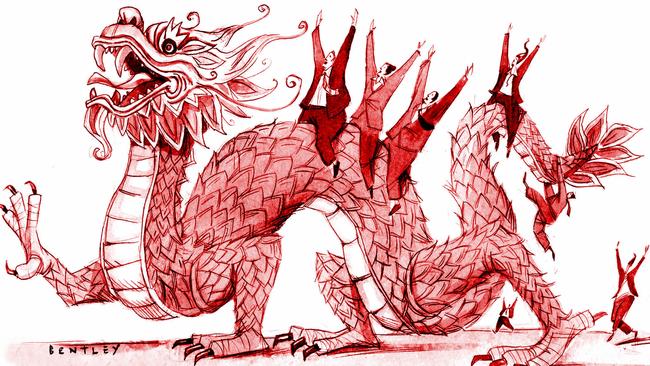China syndrome: It’s time to talk about the dragon in the room
A Chinese dairy company’s proposed takeover of a Tasmanian business raised eyebrows in finance circles this week — and with good reason, writes SIMON BEVILACQUA

Opinion
Don't miss out on the headlines from Opinion. Followed categories will be added to My News.
THE sting in the tale of this week’s takeover bid for Bellamy’s by a Chinese dairy company is that the Tassie business has for the past 20 months tried to sell its baby formula into China but has been stymied by the Chinese Government.
Bellamy’s efforts to register its formula for retail sale in China have been delayed by China’s State Administration of Market Regulations agency. As a result, the company’s share price plummeted more than 60 per cent.
Many shareholders would have initially been upbeat about the potentially lucrative sale of premium organic baby formula to the growing Chinese middle class. We’ve all read the stories of frenzied Chinese consumers buying baby formula in bulk. It’s like gold in China. Tapping the very highest end of the market with organic milk powder appeared a winner. Great theory, of course, but if you can’t get the product on the shelves, forget it. Game over.
With shareholders in despair, along comes China Mengniu Dairy Company, part-owned by a Chinese state enterprise, with a $1.5 billion takeover deal for Bellamy’s, an offer too good to refuse at a time perhaps almost any offer would have done the trick.
It won the backing of the Bellamy’s board, shares soared, and now the deal just needs the nod from Bellamy’s shareholders, the NSW Supreme Court and Foreign Investment Review Board.
Eyebrows were raised, however, with good reason.
Australian journalist Alan Kohler made an aside on one of his finance segments for ABC TV news this week and many other media analysts across the nation raised it.
Other analysts, however, dismissed these concerns as baseless conspiracy theories, explaining that to suggest the Chinese Government had deliberately thwarted Bellamy’s efforts to sell baby formula so as to smooth the way for its own state enterprise to step in and take over was too long a bow. They pointed to the fact there are many businesses from inside and outside China that are still waiting in line to get registration to sell products.
Maybe it is fanciful to think the Chinese Communist Party conspired in the takeover bid, but a prudent investor, a shrewd government and a curious public are well advised to consider the possibility.
If the deal gets the nod of approval, it will be interesting to observe how long before the company gets the green light to sell its baby formula.
Tasmanian MPs Andrew Wilkie and Jacqui Lambie have raised concerns, tapping community fears about foreign ownership, and called for proper FIRB scrutiny.
However, as one analyst pointed out, Bellamy’s is a manufacturing and marketing company, which gets its product mostly from New Zealand and Europe, and does not own cows, paddocks or any other key agricultural infrastructure. What could the FIRB have to worry about, especially regarding Tassie?
And therein lies the rub.
This deal will be done, but that does not change the fact there are issues beyond the FIRB gamut that many Australians are picking up on and feel are not being addressed by governments or agencies.
For decades the Chinese Communist Party was inward-looking and it was clearly in Australia’s interests to extend the hand of friendship and trade. It was hoped the growth and prosperity as a result of joining global markets would encourage the Chinese Communist Party to loosen the reins and morph into a more free social, political and economic model. But the past five to 10 years have proved this wrong.
China is extravagantly expanding its global trade while maintaining a central command-style model that could lead to behaviour that in other contexts is described as collusion or conspiracy or simply ganging up or bullying.
Since Australia cut Chinese companies Huawei and ZTE out of the 5G network last year, China has put restrictions on Australian coal that have savaged our coking coal exports there while Mongolian coal has flooded into China. It’s no coincidence. When government controls business, trade can be political.
The Tasmanian rock lobster industry will recall in 2010 when a Chinese crackdown on so-called grey trading nearly floored the local industry. More than 90 per cent of Tassie cray exports went to China and most was held up in its ports as the Chinese Communist Party fiddled. Livelihoods hung on the stroke of a pen.
What does the future look like in a global region where one political party owns vertically integrated stakes in business models spanning nations and cultures?
Should we insist our trade and custom comes with strings attached regarding human rights, international law and business regulation?
Should we fight harder to create a level international playing field, with protections against monopoly-type trading behaviour, when faced with the emergence of a centralised global force the likes and extent of which the world has not seen before?
These issues need to be addressed for future generations, but I fear any such public discussion will be drowned out by the empty ring of the “trade is good” mantra.


